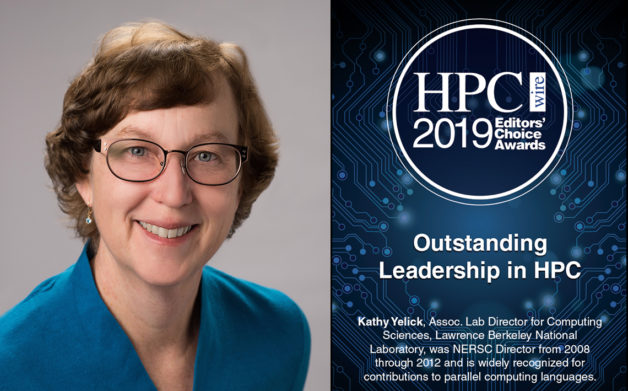
Katherine Yelick has been honored by HPCwire as their Editor’s Choice for Outstanding Leadership in high-performance computing (HPC). (Photo courtesy of Berkeley Lab Computing Sciences)
Katherine Yelick, the associate laboratory director for Computing Sciences at the U.S. Department of Energy’s Lawrence Berkeley National Laboratory (Berkeley Lab) and professor of electrical engineering and computer sciences at UC Berkeley, has been honored by HPCwire as their Editor’s Choice for Outstanding Leadership in HPC.
The award was presented today at the 2019 International Conference for High Performance Computing, Networking, Storage and Analysis (SC19), in Denver, Colorado.
Over the years, Yelick’s leadership in research has improved the programmability of high-performance computing (HPC) through innovations to programming languages and runtime systems. Her contributions to design and compiler research were key to the success of patrician global address space (PGAS) for expressing applications with irregular communication patterns on parallel machines. She is also well known for co-inventing the Unified Parallel-C and Titanium languages.
Yelick led the Sparsity project, the first automatically tuned library for sparse matrix kernels, and co-led the development of the Optimized Sparse Kernel Interface (OSKI). These tools for sparse matrices maximize performance across a wide variety of computer architectures. She has also worked on interdisciplinary teams developing scientific applications ranging from simulations of chemistry, fusion, and blood flow in the heart to analysis problems in phylogenetics. Currently, she is leading an exascale computing project in genome analysis for microbes.
In addition to her research, Yelick also teaches a number of classes at UC Berkeley related to parallel computing. She joined UC Berkeley in 1991 and has been a faculty scientist at Berkeley Lab since 1996. From 2008 to 2012, Yelick was director of the National Energy Research Scientific Computing Center (NERSC).
She currently leads the Computing Sciences Area at Berkeley Lab, which includes NERSC, the Energy Sciences Network (ESnet), and a research division of scientists and engineers in applied math, computer science, data science, and computational science; however, after 10 years in this role, she will step down at the beginning of 2020 to return to her research and teaching.
“For the past 10 years, my research has taken a back seat to my lab management responsibilities. And now there is a great need for high-end computing, for new applications in genomics, data analysis, machine learning, and other areas. I’m excited about pursuing those opportunities directly,” said Yelick. “I am grateful for this recognition from the HPCwire editors for my work so far.”
The annual HPCwire Readers’ and Editors’ Choice Awards are determined through a nomination and voting process with the global HPCwire community, as well as selections from the HPCwire editors. The awards are an annual feature of the publication and constitute prestigious recognition from the HPC community and are revealed each year to kick off the annual supercomputing conference, which showcases high performance computing, networking, storage, and data analysis.
###
Founded in 1931 on the belief that the biggest scientific challenges are best addressed by teams, Lawrence Berkeley National Laboratory and its scientists have been recognized with 13 Nobel Prizes. Today, Berkeley Lab researchers develop sustainable energy and environmental solutions, create useful new materials, advance the frontiers of computing, and probe the mysteries of life, matter, and the universe. Scientists from around the world rely on the Lab’s facilities for their own discovery science. Berkeley Lab is a multiprogram national laboratory, managed by the University of California for the U.S. Department of Energy’s Office of Science.
DOE’s Office of Science is the single largest supporter of basic research in the physical sciences in the United States, and is working to address some of the most pressing challenges of our time. For more information, please visit energy.gov/science.
